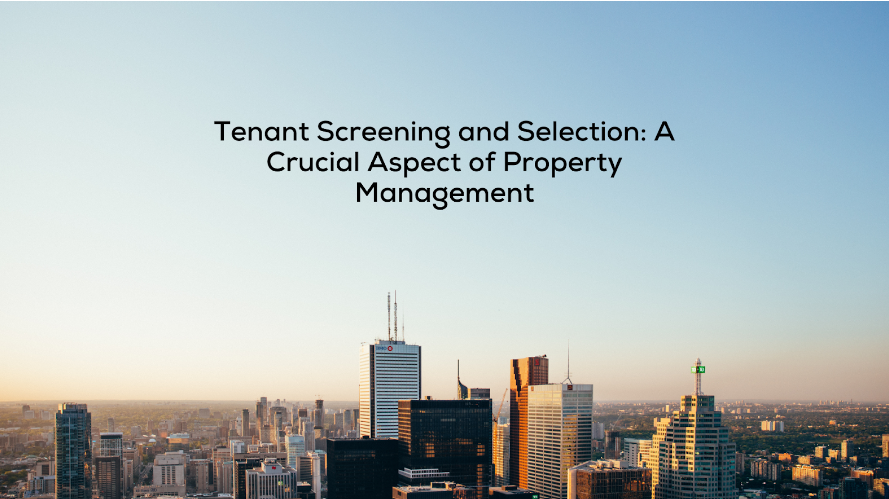Finding and selecting quality tenants is crucial for property managers. The success of your investment relies heavily on who you have living in your units. Proper tenant screening and selection help minimize risks and maximize returns.
In this article, we’ll explore key elements of the tenant selection process. We’ll go over how to screen applicants, spot red flags, check references, evaluate credit, and choose ideal tenants. Let’s get started!
Overview Of Tenant Screening Goals
Thorough tenant screening serves several important goals:
- Identify responsible tenants who pay rent on time
- Avoid problem tenants who could disturb others or damage property
- Verify applicants are who they claim to be
- Evaluate the ability to afford rent based on income and debts
- Check backgrounds for any reasons of concern
- Select tenants who will follow rules and fulfill lease terms
Screening is your chance to assess applicants’ qualifications and compatibility before approving them. Use it to gain a 360-degree view informing your leasing decision.
The Role Of Property Management Companies In Los Angeles Real Estate
Finding and retaining good tenants is crucial for property owners and managers everywhere, but tactics can vary by location. For instance, property management companies in Los Angeles have insight into tenant preferences and screening practices effective for the area. Factors like rental price averages, employment demographics, and housing regulations specific to LA impact local tenant selection approaches there versus other cities. While core principles remain constant, optimizing your tenant vetting process may involve fine-tuning your metro area.
Components Of The Tenant Screening Process
Comprehensive screening includes several key steps:
Detailed Rental Application
Have applicants complete a comprehensive rental application covering things like:
- Full legal name and contact details
- Social Security Number for credit/background checks
- Current and past home addresses
- Employer name, income, position, time employed
- Personal/professional references with contact info
- Bank account details for payment processing
- Vehicle information like make, model, year
- Emergency contact person details
- Any relevant remarks about qualifications, special requests, etc.
Thorough applications provide a foundation of info to verify and evaluate applicants.
Identity Verification
Check IDs like driver’s licenses to confirm applicants are who they claim to be. Comparing names, photos, and addresses helps avoid fraud.
Income Verification
Verify income levels match what’s stated on the application. Request recent paystubs, tax returns, and bank statements as evidence. Income should adequately cover rent and other costs.
Employment Verification
Speak with the stated employer’s HR department to confirm the position, dates employed, and salary. Beware if details seem shaky.
Rental History Checks
Contact previous landlords to check payment history, lease violations, damages, complaints, evictions, etc. Look for consistent on-time payments. Beware of frequent moves, evictions, or unpaid rent.
Credit Checks
Run a thorough credit check to verify your credit score, current debts, and any negative marks. Watch for unmanageable debts, court judgments, and bankruptcies.
Background Screening
Perform criminal and eviction record screening through approved channels to uncover any serious offenses or causes for concern.
Personal Reference Checks
Contact 1-2 references provided to assess the applicant’s reliability and character from people who know them.
Pet Screening
If applicants have pets, request veterinary records to confirm they are licensed and vaccinated. Also, verify breeds allowed per property rules.
Be sure to follow fair housing laws throughout the screening process and avoid discrimination. Focus objectively on qualifications and ability to meet lease terms.
Consulting Tenancy Databases
Various rental industry databases help identify past tenancy issues reported by other landlords and property managers:
- Eviction Records
- Damage/Complaint Reports
- Rent Payment History
- Lease Violations
- Prior Evictions/Collections
While costly, these databases provide an added layer of rental background insight from an impartial nationwide source. They can reveal serious red flags not evident elsewhere.
Balancing Tenant Screening Elements
Each screening component provides important pieces of the full picture. But avoid putting too much weight on any single factor. For instance, a low credit score doesn’t necessarily mean the person won’t pay rent reliably if other factors check out. And someone with an old petty misdemeanor isn’t necessarily high-risk if they have great landlord references.
Consider the full scope – credit, background, income, rental history, interview impressions and references for a balanced decision. Don’t let one element override others without due consideration.
Strategies For Choosing The Best Tenant
Picking the ideal tenant involves balancing several factors. The ability to afford rent is of course essential. Tenants need a stable income adequate to cover the rent plus other costs. However, also consider their income growth potential, not just current earnings.
Look at their track record too. Do they have a solid history of paying on time, maintaining units well, following rules, and keeping good relationships with past landlords and neighbors? Consistency in meeting obligations predicts future behavior.
Also assess their responsible character based on the full application, background checks, interview, and references. Do they seem conscientious, honest, and reasonable? Shared values matter for a good fit.
While an imperfect credit score does not preclude someone, evaluate if they are actively managing income and debts responsibly regardless of past issues.
Furthermore, consider lifestyle compatibility with the property and community. Will their habits mesh well? Similar priorities and standards make for an easier relationship.
Avoid fixating on any single factor when choosing tenants. Seek those who balance financial ability, compatibility and character. This leads to positive partnerships that serve both parties’ needs. Taking a big-picture view helps identify tenants who will be assets to your property and business.
Setting New Tenants Up For Success
Once selected, help tenants start strong by:
- Providing a detailed move-in checklist covering rules, contacts, procedures
- Clearly explaining policies before signing the lease to set expectations
- Assisting with utilities connections and community amenities access
- Offering a tenant portal or app for easy maintenance requests
- Following up after move-in to ensure satisfaction
Proactive support fosters longer and happier tenancies benefitting all parties. Ongoing communication, responsiveness and periodic check-ins help too.
Dealing With Rejection Decisions Carefully
Rejecting applicants can be uncomfortable. But follows key principles:
- Be objective – based solely on qualifications, not personal factors
- Stick to facts – explain specifically how criteria were unmet
- Follow Fair Housing laws – no discrimination based on protected classes
- Maintain privacy – don’t discuss decisions publicly
- Respond promptly – let them know quickly so they can make other plans
Rejection is just part of the screening process. Handling it properly avoids fair housing violations while preserving your business reputation.
FAQs
What Are The Standard Tenant Screening Fees?
Typical screening fees range from $30-$75 per applicant to cover criminal/eviction checks, credit reports, reference checks and processing time. Some landlords charge slightly more for deeper screening.
When Should I Require A Security Deposit?
Requesting a security deposit equal to 1+ month’s rent is common at lease signing to cover any damages and provide financial security. Make sure deposits comply with state laws.
What Screening Practices Could Expose Me To Fair Housing Violations?
Avoid discrimination based on protected characteristics like race, gender, religion, disabilities, national origin, or family status. Focus objectively on qualifications alone.
If A Tenant Stops Paying Rent Suddenly, What Are My Options?
You can issue pay or quit notices as a formal demand for payment. If they fail to pay after proper legal notice, you may proceed with formal eviction filings to reclaim possession.
Key Takeaways
Tenant selection has a huge impact on your investment’s success. Screen diligently by:
- Reviewing detailed rental applications
- Running background checks
- Verifying incomes and employment
- Checking references thoroughly
- Interviewing thoughtfully
- Consulting industry databases
- Balancing all factors objectively
This identifies responsible tenants who pay reliably, follow rules, and maintain properties well. Avoiding just a few problem tenancies through careful selection preserves your income and asset values in the long run. Finding ideal tenants is crucial, but takes diligence. A consistent screening process protects your investment and leads to longer, more positive tenancies for all. Invest time upfront to avoid major headaches later on. Your perfect tenant match is out there!
The solid screening takes time but adds tremendous value. Your ideal tenant match is out there!
Read Also:
- 10 Rights You Have As A Tenant That Your Landlord Won’t Tell You About
- Investing In Property Is Investing In Your Future























